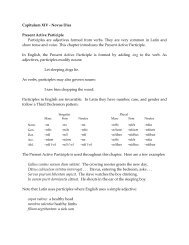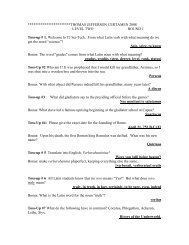Capitulum XXIV - Puer Aegrotus The Pluperfect ... - The Latin Library
Capitulum XXIV - Puer Aegrotus The Pluperfect ... - The Latin Library
Capitulum XXIV - Puer Aegrotus The Pluperfect ... - The Latin Library
Create successful ePaper yourself
Turn your PDF publications into a flip-book with our unique Google optimized e-Paper software.
<strong>Capitulum</strong> <strong>XXIV</strong> - <strong>Puer</strong> <strong>Aegrotus</strong><strong>The</strong> <strong>Pluperfect</strong> Tense! <strong>The</strong> <strong>Pluperfect</strong> Tense is used to express anterior action in past time (i.e., when Iarrived, she already had left). It is formed by adding the imperfect forms of sum to theperfect stem:! ! ! 1st Conj.! ! ! ! 2nd Conj.! ! !! ! ! ! amāveram ! amāverāmus! ! ! monueram ! monuerāmus! ! ! ! amāverās! ! amāverātis! ! ! monuerās ! monuerātis!! ! ! ! amāverat! ! amāverant! ! ! monuerat ! monuerant! !! ! ! ! ! ! 3rd Conj.! ! ! ! ! ! ! 4th Conj.! ! ! ! duxeras ! ! duxerāmus ! ! ! audīveram!! audīverāmus! ! ! ! duxeram! ! duxerātis!! ! ! audīverās! ! audīverātis! ! ! ! duxerat! ! duxerant!! ! ! audīverat! ! audīverant<strong>The</strong> passive voice of the <strong>Pluperfect</strong> tense is formed by combining the imperfect forms of sumwith the Perfect Passive Participle:! ! ! 1st Conj.! ! ! ! 2nd Conj.! ! !! ! ! ! amātus eram ! amātī erāmus!! ! monitus eram ! monitī erāmus! ! ! ! amātus erās! amātī erātis! ! ! monitus erās ! monitī erātis!! ! ! ! amātus erat! amātī erant! ! ! monitus erat ! monitī erant! !! ! ! ! ! ! 3rd Conj.! ! ! ! ! ! ! 4th Conj.! ! ! ! ductus eram ! ductī erāmus! ! audītus eram! ! audītī erāmus! ! ! ! ductus!erās! ductī erātis! ! ! audītus erās! ! audītī erātis! ! ! ! ductus!erat! ductī erant! ! ! audītus erat! ! audītī erant<strong>The</strong>se tenses behave identically to the Past Perfect tense in English:! ! Mārcus humī iacuerat et ā Sextō pulsātus erat. Marcus had lain on the ground and had! ! ! ! been hit by Sextus.! ! ! ! ! ! ! !<strong>The</strong> Perfect Tense of Deponent Verbs! <strong>The</strong> Perfect Tense of deponent verbs is derived from the third principal part of theverb (as with all verbs). Deponent verbs will have only three principal part (lacking thefourth principal part which is the perfect passive participle). Thus: consolor, -ārī, -ātussum; comitor, -ārī, -ātus sum; loquor, -i, locūtus sum; patior, -ī, passus sum, etc.
<strong>The</strong> perfect tense of a deponent verb is formed regularly from the third principal part ofthe verb:! ! consolātus sum - I consoled! ! ! ! consolātī sumus - we consoled! ! consolātus es! - you consoled! ! ! consolātī estis - you consoled! ! consolātus est! - he, she, it consoled! consolātī sunt - they consoled!<strong>The</strong> Imperative Mood of Deponent Verbs! <strong>The</strong> singular of the Imperative Mood of deponent verbs has the form of a regularinfinitive:! ! Intuēre pedēs meōs, look at my feet.! ! Cōnsōlāre mē, console me!! ! Laetāre tē nōn inclūsum esse, be glad that you are not shut in!<strong>The</strong> Ablative of Comparison! <strong>The</strong> ablative (without preposition) is used to express comparison. Obviously, it isfound in sentence with a comparative express or implied.!! ! Pēs dexter māior est pede laevō. My right foot is bigger than my left foot.! ! Is nōn pēior fuerat cēterīs. He had not been worse than the others.! ! Melior sum frātre meō. I am better than my brother.! ! Nōn putō eum vōbīs stultiōrem esse. I donʻt think he is more stupid than you.! ! At certē pigrior est nōbīs. But certainly he is lazier than us.Vocabulary!latus, -eris n sidedolor, -ōris m pain, griefos, ossis n bonepār, pāris, even, equalimpār, -pāris, uneven, unequalmīror, -ārī, -ātus sum, to wonder atpercutiō, -ere, -cussī, -cussum, to strikefrangō, -ere, frēgī, fractum, to breakfleō, -ēre, flēvī, to weeppatior, -ī, passus sum, to permit; suffernoscō, -ere, nōvī, nōtum, to knowcupiō, -ere, -īvī, -ītum, to desire


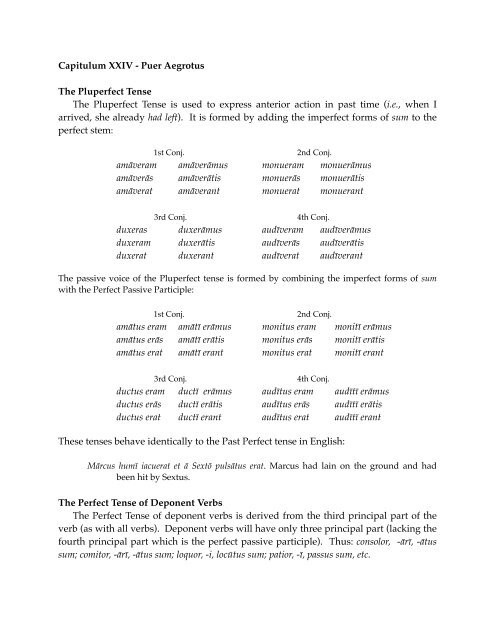
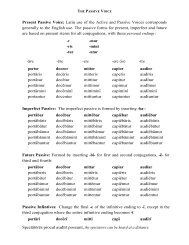
![[10] Victoriae Romanae fama cum pervasisset in ... - The Latin Library](https://img.yumpu.com/49871968/1/190x245/10-victoriae-romanae-fama-cum-pervasisset-in-the-latin-library.jpg?quality=85)
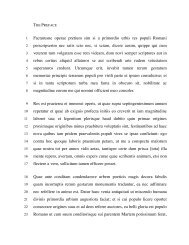
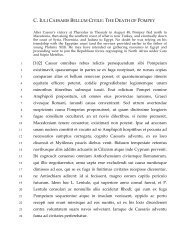
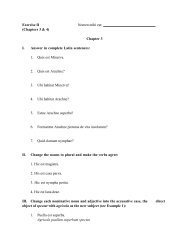
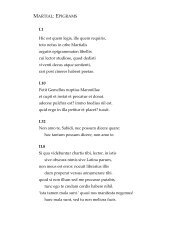
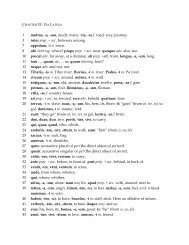
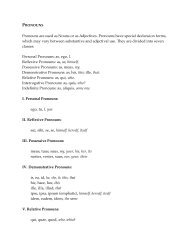
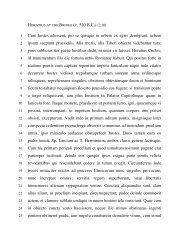
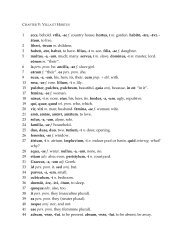
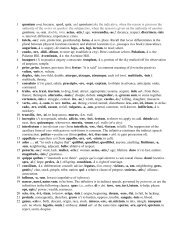
![[17] Nosti quendam Barbarum nostrae civitatis ... - The Latin Library](https://img.yumpu.com/45799776/1/190x245/17-nosti-quendam-barbarum-nostrae-civitatis-the-latin-library.jpg?quality=85)
